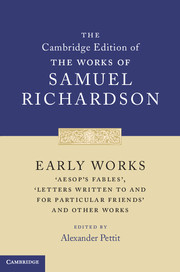Book contents
- Frontmatter
- Dedication
- Contents
- General Editors’ Preface
- Acknowledgements
- Chronology
- List of Abbreviations
- General Introduction
- Textual Introduction
- The Apprentice’s Vade Mecum (1733)
- A Seasonable Examination of the Pleas and Pretensions (1735)
- Preface to Aubin, A Collection of Entertaining Histories and Novels (1739)
- Aesop’s Fables (1739)
- Letters Written to and for Particular Friends (1741)
- Six Original Letters Upon Duelling (1765)
- Appendix: The Infidel Convicted (1731)
- Postscript
- Emendations
- Word-division
- Bibliographical Descriptions of Early Editions
- Explanatory Notes
- Index
Letter XC
Published online by Cambridge University Press: 30 June 2022
- Frontmatter
- Dedication
- Contents
- General Editors’ Preface
- Acknowledgements
- Chronology
- List of Abbreviations
- General Introduction
- Textual Introduction
- The Apprentice’s Vade Mecum (1733)
- A Seasonable Examination of the Pleas and Pretensions (1735)
- Preface to Aubin, A Collection of Entertaining Histories and Novels (1739)
- Aesop’s Fables (1739)
- Letters Written to and for Particular Friends (1741)
- Six Original Letters Upon Duelling (1765)
- Appendix: The Infidel Convicted (1731)
- Postscript
- Emendations
- Word-division
- Bibliographical Descriptions of Early Editions
- Explanatory Notes
- Index
Summary
Against a young Lady's affecting manly Airs; and also censuring the modern Riding-habits.
Dear Betsey,
The Improvement that is visible in your Person, since your going to Bury, gives me much Pleasure; and the dawning of fine Sense, and a good Judgment, that discovers itself in your Conversation, makes me hope to see every Perfection of my Sister, your late excellent Mother, revived in you.
Yet one thing the Duty of a tender Uncle obliges me to blame in you; and that is, a certain Affectation that of late obtains in your Behaviour, of imitating the Manners of the other Sex, and appearing more masculine than either the amiable Softness of your Person or Sex can justify.
I have been particularly offended, let me tell you, my Dear, at your new Riding-habit; which is made so extravagantly in the Mode, that one cannot easily distinguish your Sex by it. For you neither look like a modest Girl in it, nor an agreeable Boy.
Some Conformity to the Fashion is allowable. But a cock’d Hat, a lac’d Jacket, a Fop's Peruke, what strange Metamorphoses do they make! And then the Air assumed with them, so pert, and so insipid, at the same time, makes, upon the whole, such a Boy-girl Figure, that I know of nothing that would become either the Air, or the Dress, but a young Italian Singer. For such an one, being neither Man nor Woman, would possibly be best distinguished by this Hermaphrodite Appearance.
In short, I would have you remember, my Dear, that as sure as any thing intrepid, free, and in a prudent Degree bold, becomes a Man; so whatever is soft, tender, and modest, renders your Sex amiable. In this one Instance we do not prefer our own Likeness; and the less you resemble us, the more you are sure to charm: For a masculine Woman is a Character as little creditable as becoming.
I am no Enemy to a proper Presence of Mind in Company; but would never have you appear bold, talkative, or assured. Modesty in the outward Behaviour, is a strong Prepossession in a Lady's Favour; and, without it, all your Perfections will be of little Service, either as to Reputation or Preferment. You want not Sense: and, I hope, will take kindly these well-intended Hints from
Your affectionate Uncle.
- Type
- Chapter
- Information
- Early Works'Aesop's Fables', 'Letters Written to and for Particular Friends' and Other Works, pp. 422 - 423Publisher: Cambridge University PressPrint publication year: 2011

